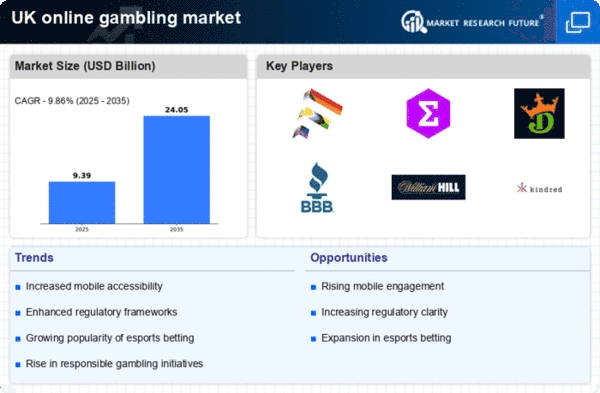Regulatory Changes and Compliance
The online gambling market in the UK is significantly influenced by regulatory changes and compliance requirements. The UK Gambling Commission has implemented stricter regulations aimed at promoting responsible gambling and protecting consumers. These regulations may include enhanced age verification processes and limits on advertising. As a result, operators are compelled to invest in compliance measures, which could lead to increased operational costs. However, adherence to these regulations is likely to foster consumer trust, potentially increasing market participation. Data indicates that markets with robust regulatory frameworks can experience growth rates of up to 15% as players feel safer engaging in online gambling activities. Thus, regulatory changes play a crucial role in shaping the landscape of the online gambling market.
Economic Factors and Disposable Income Trends
The online gambling market in the UK is closely tied to economic factors and trends in disposable income. As the economy stabilizes and disposable income levels rise, individuals are more likely to spend on leisure activities, including online gambling. Recent economic reports indicate that consumer spending in the entertainment sector has increased by approximately 5% over the past year. This trend suggests that as financial conditions improve, the online gambling market could experience a corresponding boost in participation and revenue. However, economic downturns or fluctuations in disposable income may pose risks to market growth. Therefore, understanding these economic dynamics is essential for stakeholders in the online gambling market.
Changing Demographics and Consumer Preferences
The online gambling market in the UK is witnessing a shift in demographics and consumer preferences. Younger generations, particularly millennials and Gen Z, are increasingly engaging in online gambling activities. This demographic shift is accompanied by a preference for interactive and social gaming experiences, such as live dealer games and skill-based betting. Data indicates that around 40% of new players in the online gambling market are under the age of 35, suggesting a need for operators to adapt their offerings to meet these preferences. Additionally, the rise of social media and online communities is influencing how individuals perceive and engage with gambling. As these trends continue, the online gambling market may need to innovate to attract and retain this younger audience.
Technological Advancements in Gaming Platforms
The online gambling market in the UK is experiencing a surge in technological advancements, particularly in gaming platforms. Innovations such as virtual reality (VR) and augmented reality (AR) are enhancing user experiences, making online gambling more immersive. According to recent data, the integration of these technologies could potentially increase user engagement by up to 30%. Furthermore, the rise of artificial intelligence (AI) in personalizing gaming experiences is likely to attract a broader audience. As platforms evolve, they are expected to offer more sophisticated features, which may lead to increased revenue streams for operators. This technological evolution not only enhances player satisfaction but also positions the online gambling market as a leader in digital entertainment.
Increased Internet Penetration and Accessibility
The online gambling market in the UK is benefiting from increased internet penetration and accessibility. With over 95% of households having internet access, the potential customer base for online gambling has expanded significantly. This accessibility is further enhanced by the proliferation of smartphones, which allows users to gamble anytime and anywhere. Recent statistics suggest that mobile devices account for approximately 70% of all online gambling transactions, indicating a shift in consumer behavior. As more individuals gain access to the internet, the online gambling market is likely to see a corresponding increase in participation rates. This trend suggests that operators may need to optimize their platforms for mobile use to capture this growing demographic.
















